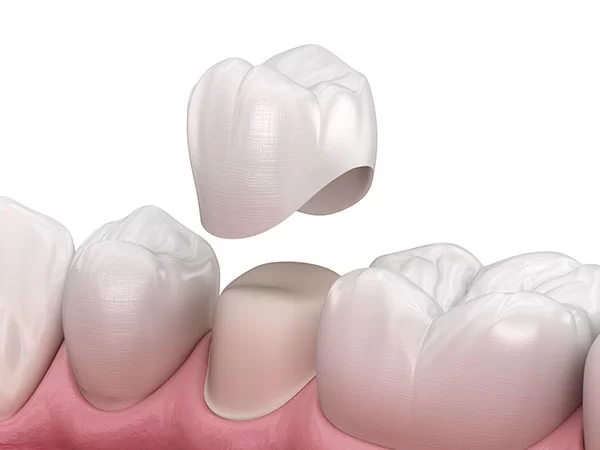Please note we may not offer this service at our office. Call our Wilmington office at (302) 999-7600 or our Seaford office at (302) 536-7589 for more information.
Discover How a Metal Dental Crown Can Restore Your Tooth
When it comes to dental crowns, there are several options available. One of the most prevalent materials for crowns is metal. Metal-based dental crowns have been utilized for decades and remain a favored choice among many patients.
For more information about metal dental crowns, contact our dentists in Wilmington and Seaford, DE, by calling our Wilmington office at (302) 999-7600 or our Seaford office at (302) 536-7589 today.
What Are Metal Dental Crowns?
Metal dental crowns have been used for many years and are a favored option for numerous patients. These crowns are renowned for their robustness and longevity, making them an ideal choice for back teeth. A metal crown is also highly resistant to wear and tear, capable of enduring a substantial amount of force.
What Type of Material is Used for a Metal Dental Crown?
Metal dental crowns come in various types, including:
- Gold crowns: Crafted from a gold alloy, these crowns are known for their excellent biocompatibility and resistance to corrosion.
- Silver crowns: Composed of silver, tin, and other metals, these crowns are durable and cost-effective but may discolor over time.
- Platinum crowns: Made from a platinum alloy, these crowns are robust, long-lasting, and resistant to corrosion, although they are more costly than other metal crowns.
- Palladium crowns: These crowns consist of a mixture of palladium, gold, and other metals, making them a suitable choice for patients with metal allergies.
- Base metal alloy crowns: Constructed from non-noble metals like nickel, chromium, and titanium, these crowns are strong, durable, and economical but may cause allergic reactions in some individuals.
Benefits of a Metal Crown
Opting for a metal crown offers numerous advantages, such as:
- Strength and Durability: Metal crowns are incredibly robust and able to withstand substantial pressure, making them ideal for back teeth.
- Longevity: With proper care and maintenance, these crowns can last for many years, often exceeding 20 years.
- Preservation of Natural Tooth Structure: They require minimal removal of the natural tooth structure compared to other crown types like porcelain or ceramic.
- Resistance to Wear and Tear: Less prone to chipping or breaking than other crown varieties.
- Biocompatibility: Metals like gold and palladium used in dental crowns are highly biocompatible, reducing the likelihood of allergic reactions.
Drawbacks
While metal crowns offer several benefits, there are a few drawbacks to consider:
- Appearance: Metal crowns are not tooth-colored and may stand out more than other crown types, particularly when used on front teeth.
- Heat Conductivity: Metal crowns can conduct heat and cold, potentially causing discomfort for some patients.
- Wear on Opposing Teeth: Due to their hardness, metal crowns may lead to increased wear on the opposing teeth compared to other crown materials.
- Cost: Depending on the alloy used, metal crowns can be more expensive than other crown types.
- Allergies: Although uncommon, some patients may experience allergic reactions to certain metals in dental crowns, leading to inflammation and other health concerns.
The Metal Dental Crown Process
Preparation and Impressions
The initial step in receiving a metal crown involves preparing the tooth. Your dentist will eliminate any decay or damage and shape the tooth to accommodate the crown. If there isn’t sufficient structure to support the crown, they may need to build up the tooth.
After preparation, your dentist will take impressions of the tooth and the surrounding teeth. These impressions are sent to a dental lab, where a custom crown is crafted to fit your tooth and bite precisely. Meanwhile, a temporary crown will be placed on the tooth to protect it until the permanent crown is ready.
Crown Placement
Once your permanent crown is ready, you’ll return to the dental office for the placement procedure. The temporary crown will be removed, and the new crown will be positioned on the tooth to assess the fit and make any necessary adjustments.
After ensuring a perfect fit, your dentists in Wilmington and Seaford will secure the crown in place using a dental adhesive. They will then check your bite to confirm that the crown aligns correctly with the opposing teeth.
Follow-Up Care
After the crown is placed, we’ll provide you with guidance on how to care for it. Maintaining good oral hygiene by brushing and flossing regularly is important to ensure the crown and surrounding teeth remain healthy.
Metal Crown Costs
The cost of metal crowns can fluctuate based on several factors, including the location, the dentist’s skill level, the complexity of the procedure, and any additional treatments required. In general, metal crowns are often more cost-effective compared to other crown types due to the lower cost of materials and the straightforward fabrication process.
Typically, the price of a metal crown ranges from $800 to $1,500 per tooth. However, this is merely an estimate and actual costs can vary widely. Additionally, dental insurance may influence the out-of-pocket expenses for a metal crown, as some insurance plans might cover part of the cost.
Alternative Crown Options
Due to the potential for metal crowns to affect the appearance of a smile, many patients consider other crown alternatives:
- Porcelain-Fused-to-Metal (PFM) Crowns: These crowns feature a metal base with a porcelain overlay. The porcelain offers a more natural tooth-like appearance, while the metal ensures strength. However, if gums recede, the metal base might become visible through the porcelain.
- All-Porcelain or All-Ceramic Crowns: Made entirely from porcelain or ceramic materials, these crowns are celebrated for their outstanding aesthetic qualities. They mimic the translucence and color of natural teeth. Although they may not be as strong as metal or PFM crowns, advancements in materials have enhanced their durability.
- Zirconia Crowns: Zirconia is an exceptionally strong ceramic material. It can be used alone or combined with porcelain for enhanced aesthetics. Its strength rivals that of metal, making it suitable for both front and back teeth.
- Composite Resin Crowns: Constructed from a blend of plastic and glass, these crowns are more affordable than other types. While they can be visually appealing, they may wear down more quickly than other materials.

Frequently Asked Questions
Yes, metal crowns are generally regarded as safe. They have been utilized for many years and have a well-established history of success. However, some individuals may have allergies to specific metals used in dental crowns, so it’s crucial to discuss any allergies or concerns with your dentist beforehand.
Metal crowns are known for their longevity, typically lasting for many years, often exceeding 20 years or more with proper care and maintenance. The durability of a dental crown is influenced by factors such as oral hygiene practices, diet, and general wear and tear.
Although metal crowns are generally considered safe, they may interfere with certain medical procedures like MRI (magnetic resonance imaging). The presence of metal can create artifacts on the MRI image, potentially complicating the interpretation of results.
If you have a metal dental crown, it’s important to inform your healthcare provider before having an MRI so that they can take the necessary precautions.
Determine if Metal Crowns Suit Your Dental Requirements
Metal crowns provide a robust and long-lasting choice for those addressing tooth decay or other dental issues. Consult with Drs. Brown and Baran to explore your dental crown options and determine the best choice for your individual needs.
To schedule a consultation and start your journey toward a healthy, radiant smile, call our Wilmington office at (302) 999-7600 or our Seaford office at (302) 536-7589. We’re delighted to welcome new and returning patients from Delaware and its neighboring regions.



